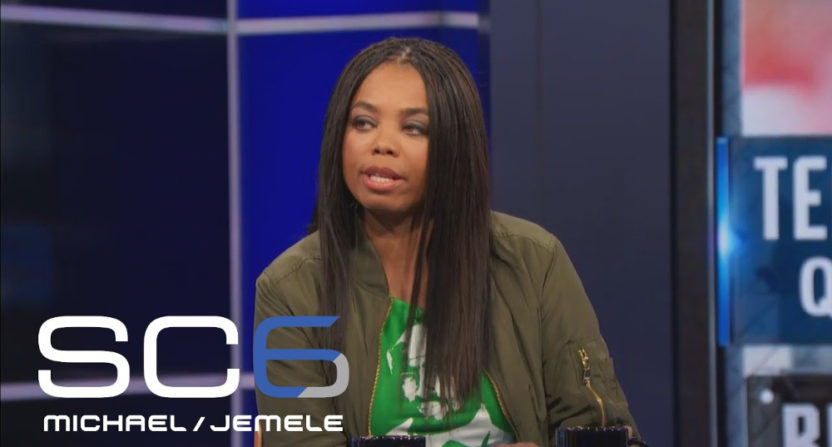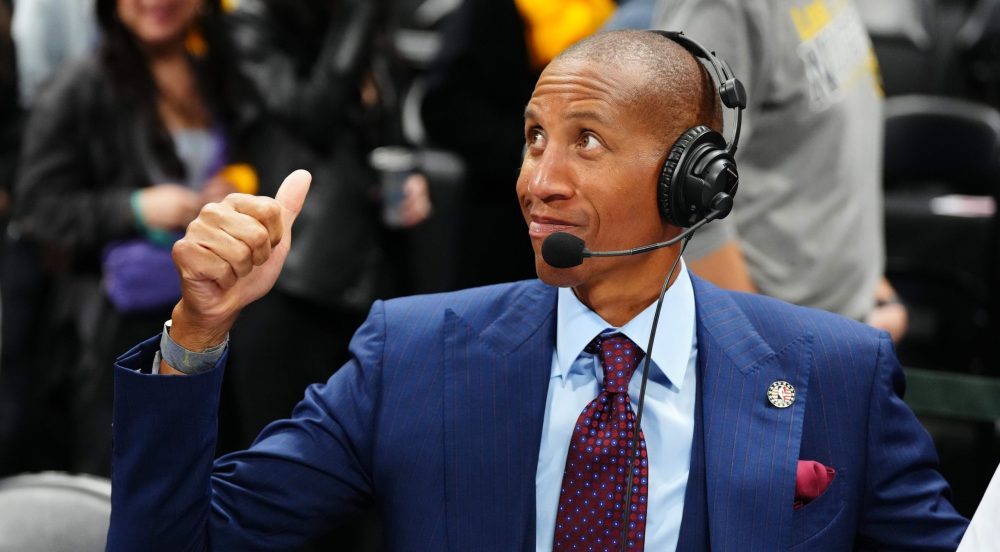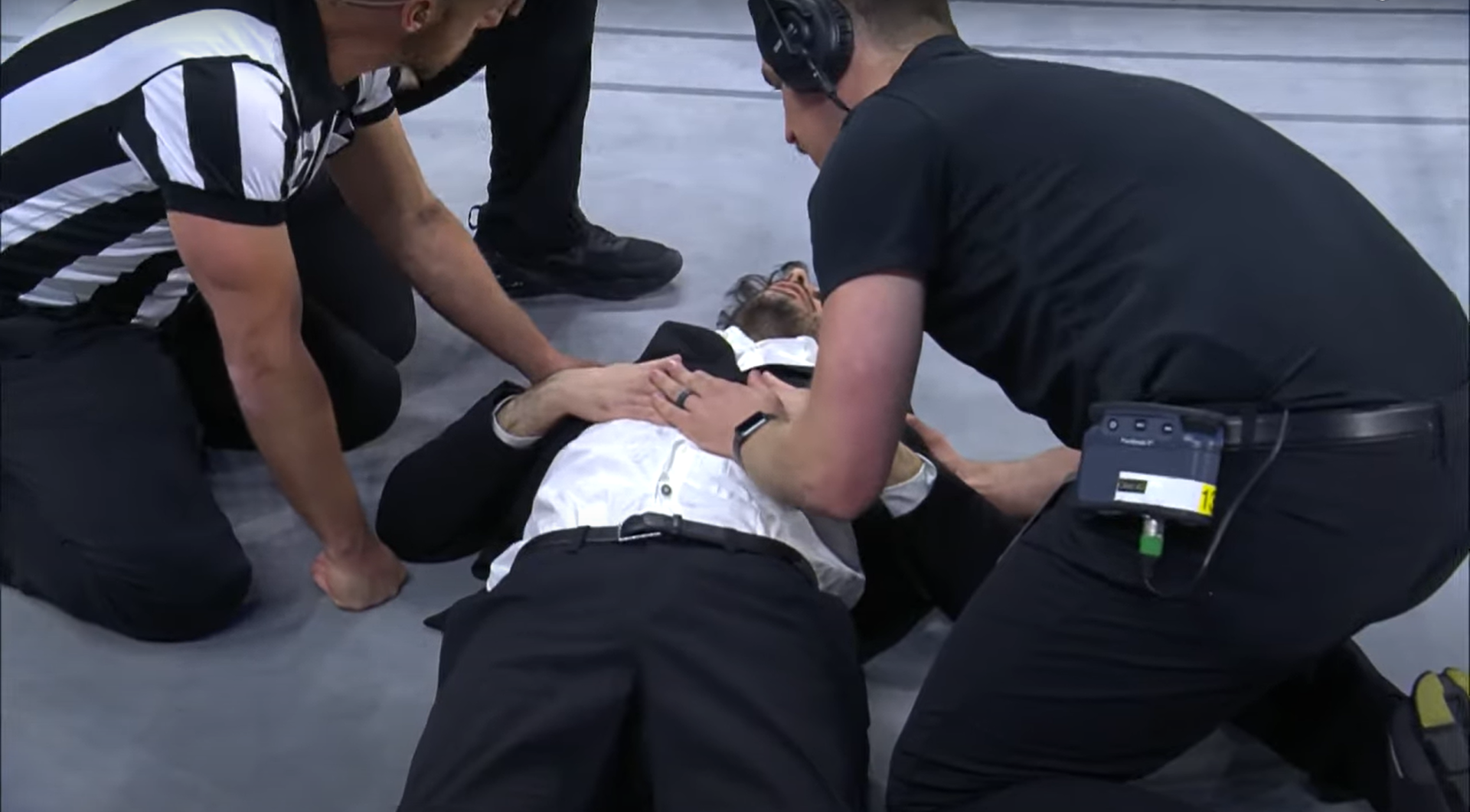When news broke of Jemele Hill being suspended by ESPN for two weeks thanks to another violation of their social media policy, there was a sense of befuddlement. Hill was not previously suspended when she tweeted that President Donald Trump was a “white supremacist” and there was nothing in the past 48 hours that had even come close to creating the same buzz on social media.
In fact, when the announcement was made by ESPN PR, they included a link to Hill’s tweet that was apparently in violation of their social media policy. Perhaps it was an aid to everyone who was confused over what exactly she could have done to draw such a harsh discipline from ESPN.
This play always work. Change happens when advertisers are impacted. If you feel strongly about JJ's statement, boycott his advertisers. https://t.co/LFXJ9YQe74
— Jemele Hill (@jemelehill) October 9, 2017
Wait.. that’s it?
The tweet talking about boycotting sponsors of the Dallas Cowboys for those unhappy with Jerry Jones’ hardline stance on taking a knee during the national anthem was part of a larger thread with Hill conversing with Twitter followers.
No, I think the Cowboy fans — the paying customers — need to pick up this fight. Don't look to Dez or Dak. YOU do it. https://t.co/f9YjZFgGGt
— Jemele Hill (@jemelehill) October 9, 2017
Or, how about not patronizing the advertisers who support the Cowboys? You can watch and do that, right? https://t.co/duPNqxFta7
— Jemele Hill (@jemelehill) October 9, 2017
ESPN’s statement providing the reasoning for the Hill suspension is curious to say the least, especially when you consider the content of Hill’s thread above. There is no mention of ESPN. No mention of Donald Trump. No foul language. Nothing that any people group would find offensive. There’s honestly nothing there aside from someone explaining how boycotts work.
ESPN's Statement on Jemele Hill: pic.twitter.com/JkVoBVz7lv
— ESPN PR (@ESPNPR) October 9, 2017
So what is it exactly about Hill’s tweets that “reflect negatively on ESPN?” Because from this vantage point, it’s impossible to see the connection or how we could suddenly get to the SC6 anchor being suspended now for this.
Hill being suspended at this juncture is just plain bizarre, especially considering that there was nobody calling for it at this time, unlike a couple weeks ago when it seemed like the entire American society had Hill and ESPN under the microscope. Hill’s two-week suspension for these tweets feels like the sports media equivalent of a college program being retroactively disciplined years later and having wins taken away from them. It’s confusing. It doesn’t make sense. And we’re all left wondering what really matters.
ESPN ultimately chose to stand behind Jemele Hill when she tweeted out her harsh criticism of President Trump. Even when there were calls from the White House itself to punish Hill, the network chose not to take her off the air. Even if it’s completely unrelated, Trump is already claiming something that amounts to a victory lap as he piles on Hill on Twitter. Does she now not have any course of action to defend herself?
Given the hyper-sensitive political climate and how polarizing the issue became, it’s shocking to see Hill benched for something that by comparison is a mere blip on the radar. That is until you take a deeper dive into ESPN’s history, particularly when it comes to when and where and how they choose to hand out discipline, which has been historically inconsistent over the years. To put Hill’s two-week suspension into context, it’s twice as long as ESPN gave Stephen A. Smith for suggesting that women bring domestic violence upon themselves. In fact, the only thing that is consistent is that ESPN acts when it feels as though there is any threat to their bottom line or their business partners.
Perhaps the most infamous ESPN suspension was Bill Simmons. It wasn’t the President of the United States who he went after, it was NFL commissioner Roger Goodell. Simmons was suspended three weeks back in 2014 when he called Goodell a liar and dared ESPN management to do something about it.
While Jerry Jones isn’t quite Roger Goodell, he’s about as close as one could get as arguably the most powerful owner in the sport. ESPN pays the NFL $1.9 BILLION DOLLARS per year and has proven over the years that they will protect the shield. Going after the president is one thing, but apparently even the allusion to a boycott of Cowboys sponsors is enough to spring ESPN into action to prove they’re not going to do anything to hurt their largest financial rights partner.
ESPN has a history of making sure they stay in a good relationship with the NFL. The cancelation of Playmakers and the abandonment of League of Denial are perhaps the two most notable examples of the network succumbing to the league’s wishes. Simmons’ suspension is another example where the weight of the billion dollar rights deal with the league surely tipped the scales. In this case, if you hurt the Cowboys, you hurt the NFL. And if you hurt the NFL, you hurt ESPN where it matters most – dollars and cents.
For all of the recent criticism of ESPN, it’s amazing to think that we’ve ended up back at this point that we’ve visited so often throughout the years – the question of ESPN being able to separate their business interests and their journalistic endeavors. Hill’s suspension isn’t the only time that question has been raised this week, either. Over the weekend we basically saw an organized campaign from ESPN to discredit Washington head coach Chris Petersen when he dared to criticize the league’s late start times on the network. Kirk Herbstreit even went on national television and said that the Pac 12 should thank ESPN for their current relationship.
The underlying message in both these cases – never do anything that would step out of line when it comes to our billion dollar rights deals. Just ask former SportsCenter anchor Robert Flores.
Don’t mess with their 💰.
That always always always comes first.— Robert Flores (@RoFlo) October 9, 2017
It’s not as if Hill spent hours on Twitter trying to rally people into boycotting the Cowboys, giving e-mail addresses out for their corporate contacts for her followers to angrily e-mail en masse. She didn’t start an internet petition, either. She merely said, “if you feel strongly about JJ’s statement, boycott his advertisers.”
How are the scores of Hill’s co-workers who supported her through the Trump controversy supposed to react to this current suspension? What’s the next thing that someone at ESPN will get suspended for tweeting? Is it even worth any ESPN personalities taking to Twitter to engage or speak out personally on any subject?
It’s precisely for these reasons that Hill’s suspension is incredibly concerning. Whatever you feel about her politics, the fact that a journalist can get punished for even talking about boycotting sponsors of an NFL team is very troubling. The question that needs to be asked right now is why is that a violation of ESPN’s social media policy? Is it solely due to ESPN’s mega-billion dollar financial relationship with the NFL? Because if so, that’s a troubling admission for every journalist working at ESPN.





